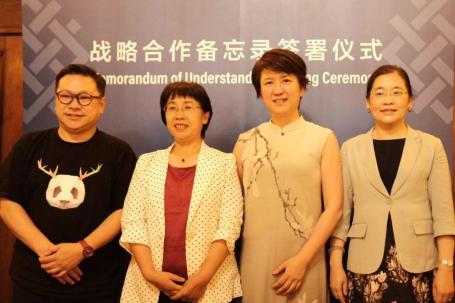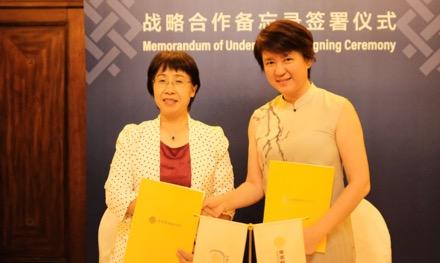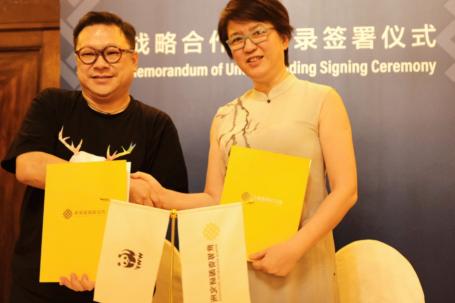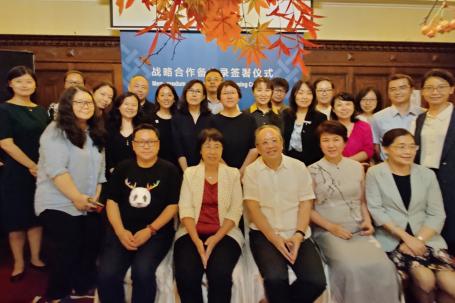Renewable Energy Promotes the Green Development of the Belt and Road Initiative
Beijing (August 19 2020) — World Resources Institute (WRI) organized and held the “Scaling Up Overseas Renewable Energy Pilots Kick-off Meeting and Workshop,” in which the strategic cooperation memorandums were signed with the Foreign Environmental Cooperation Center (FECO), Ministry of Ecology and Environment (MEE) and the World Wide Fund for Nature (WWF). While enhancing the cooperation relationships, WRI, FECO, and WWF conducted in-depth exchanges and discussions with more than 30 experts and partners from various parties.

Dr. Fang Li, WRI China's chief representative, pointed out: China has placed the competitive role by gradually becoming the country with the largest renewable energy industry in the world. In the current complicated international situation, the Belt and Road Initiative (BRI) green investment plays a positive role to global post-pandemic recovery in promoting the green recovery and low-carbon transformation. However, climate change is much more likely to occur and possesses more significant risks. Global post-pandemic recovery is a prime time for renewable energy investment to improve the existing energy structure and prevent the lock-in effect of carbon-intensive energy investment. MEE proposed to promote high-quality economic and social development with high-level environmental management. Clean energy investment is also a solution to conduct pollution source control, and the digitalization brings new opportunities for the promotion of clean energy. From an international perspective, BRI is an important measure to the United Nations to achieve sustainable development goals, and renewable energy investment can help provide support for countries in achieving their nationally determined contributions (NDCs) targets. Additionally, the promotion of renewable energy investment is helpful to achieve the advancement of China’s internal and external “Dual Circulation” economic model, promote the technology research and development and business model innovation of renewable energy, and boost the construction of ecologically-friendly civilization and a community with shared future for mankind.
Lei Hongpeng, Director of Climate Change and Country Director for China at the Children’s Investment Fund Foundation (CIFF), emphasized that it is extremely urgent for human beings to make joint efforts in addressing climate change, and more attention to energy transition has been paid all over the world with growing calling for green development. To enlarge overseas renewable energy investment will have a profound impact on improving the well-being of people in host countries and promoting green economic recovery and global low-carbon transition.

Zhou Guomei, Secretary of the Party Committee and Deputy Director of FECO, MEE said, “To promote the green development of BRI, relevant institutions, think tanks, research institutes, universities, and relative ministries and commissions need to work together to build and develop a network of partnerships, strengthen policy dialogues, formulate green standards, reinforce environmental risk control and management, and promote technological innovation and sharing.”

Sze Ping LO, Chief Representative and Director General of WWF China, pointed out that energy cooperation is one of the priorities of BRI development and a key area for promoting international green recovery. Renewable energy has the advantage of being more environmentally resilient and is able to create more job opportunities. With its leading power in renewable energy development, China has the capacity to leverage its industrial advantages and international cooperation strength, and plays an important role in promoting the global transition to a low-carbon future.
Li Xia, Division Director of FECO, MEE introduced the strategic concepts and current status of the Lancang-Mekong Cooperation Green Economic Development Belt. She believed that the investment and host countries can all significantly reduce the risks from climate change in the future, once China's overseas energy investment shifts from traditional fossil fuels to renewable energy.
Manish Bapna, Executive Vice President and Managing Director of WRI on behalf of the WRI Global, shared his thoughts via a videocassette recorder during the memorandum signing ceremony: BRI is playing a very important role, especially in the post COVID-19 era. How we begin to accelerate the shift of BRI from coal or conventional energy sources to renewable or clean energy in a rapid fashion is one of the big challenges we face. Renewable energy investment can not only improve the economic profits of the projects, but it can also reduce the financial risks of banks and global climate risks. What we need is taking immediate action.

In the second half of the workshop, all the experts discussed the topics about how to promote Chinese overseas renewable energy investment under the relevant intergovernmental cooperation frameworks and how to support project implementation through financial compliance and innovation. The suggestions include:
- In the process of advancing the green BRI, MEE should play a leading role in the following areas: establishing the mechanism of grievance redressal for environmental issues of overseas investment projects; cooperating with the National Development and Reform Commission, the Ministry of Commerce and other decision-making departments and financial institutions to establish the BRI green projects’ list and introduce supporting policies and evaluation systems; and linking environmental protection issues together with poverty reduction to increase the possibility of project implementation.
- Establish a communication platform, strengthen internal and external exchanges among relevant ministries, financial institutions and enterprises, form a consensus on green development, and formulate overall strategies with clear assignment distribution.
- Establish an information-sharing mechanism and carry out projects according to local circumstances. Fully consider the energy development strategies, policies and environmental protection laws and regulations of host countries, identify application scenarios to carry out demonstrations, and explore best practices. Projects with commercial development conditions can accelerate on their development financing and implementation through the "roundtable" communication mechanism among stakeholders from China and BRI countries; projects without commercial development conditions can make use of the cooperation mechanisms and platforms between China and BRI countries/regions, combine poverty alleviation, international aid and other means to integrate and promote resources through government guidance, policy support, and target initiatives.
- Learn from relative experience by referring to the support and investment of Denmark, Germany and other countries to China’s renewable energy development years ago, as well as the models of European and American countries carrying out projects in host countries, such as the assessment mechanism of green intellectual property rights and the promotion mechanism of industrialization.
- The greening of financial institutions possesses significance for achieving the green development of BRI. Taking overseas investment projects and social risk management mechanisms as a starting point, a top-down approach should be adopted to initiate the internal green transformation of financial institutions.
The above experts include: Deputy Director ZHAI Guiying, Division Director LI Xia, and Division Director TANG Yandong from FECO, MEE, WANG Weikang, Energy Transition Program Director of WWF China, TANG Dingding, Joint Secretary-General of the International Finance Forum, WANG Luo, Director of International Development and Cooperation Institute, Chinese Academy of International Trade and Economic Cooperation, YAN Bingzhong, Director of Foreign Cooperation Center, China Renewable Energy Engineering Institute, RAO Jianye, Assistant to the Director of the International Department of the China Electric Power Planning & Engineering Institute, LI Dan, Executive Secretary of Renewable Energy Committee of China Association of Circular Economy, SHEN Yiyang, Director of Beijing Institute of Inclusive Development, ZHONG Lijin, Chief of Staff of the Energy Foundation China, YANG Fuqiang, Senior Advisor of China Program, Natural Resources Defense Council, and ZHANG Yan, expert from the South-South Cooperation and Partnerships at United Nations Children’s Fund China.
Increasing the development and utilization of renewable energy on a global scale is the key to achieving the United Nations’ sustainable development goals, and one of the most important measures to achieve the targets set in the Paris Agreement. As a core force in promoting the development of the global renewable energy industry, China has 40% of wind power and 70% of solar power in the global industry chain resources; in the solar power industry, China is the only country in the world, that has the capability to invest in and develop from upstream materials to midstream components and to downstream power plants; in the global context of addressing climate change and energy transition, the international cooperation potential for Chinese enterprises to participate in sustainable energy infrastructure investment and construction is huge. It is vital to the green development of BRI to incorporate green development and high-quality environmental management into the decision-making process and investment plans of the government, banks, and enterprises.